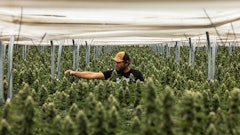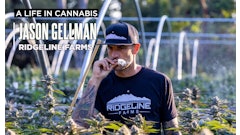[Press release] BERKELEY, Calif., Oct. 19, 2016 /PRNewswire/ -- Steep Hill, the global leader in cannabis testing and analytics, today published an early report on the prevalence of pesticide contamination in the medical cannabis supply chain in California. According to the lab's new technology and recently launched "quantified pesticide analysis," 84.3% of cannabis samples submitted in Steep Hill's Berkeley lab tested positive for pesticide residues. These results were significantly higher than expected and are cause for concern for California cannabis consumers.
Myclobutanil, typically sprayed on California grapes, almonds and strawberries, is legally listed as a "general use pesticide," but heating up the chemical, as is the case when smoking cannabis, converts Myclobutanil into Hydrogen Cyanide. Hydrogen Cyanide is a Schedule 3 substance under the Chemical Weapons Convention. Of paramount concern is the extremely high level of Myclobutanil detected in cannabis samples tested by Steep Hill, which is in excess of 65% of all samples.
Jmichaele Keller, President and CEO of Steep Hill, said in making the announcement, "Those in the cannabis community who feel that all cannabis is safe are not correct given this data – smoking a joint of pesticide-contaminated cannabis could potentially expose the body to lethal chemicals. As a community, we need to address this issue immediately and not wait until 2018."
Read more
Myclobutanil, typically sprayed on California grapes, almonds and strawberries, is legally listed as a "general use pesticide," but heating up the chemical, as is the case when smoking cannabis, converts Myclobutanil into Hydrogen Cyanide. Hydrogen Cyanide is a Schedule 3 substance under the Chemical Weapons Convention. Of paramount concern is the extremely high level of Myclobutanil detected in cannabis samples tested by Steep Hill, which is in excess of 65% of all samples.
Jmichaele Keller, President and CEO of Steep Hill, said in making the announcement, "Those in the cannabis community who feel that all cannabis is safe are not correct given this data – smoking a joint of pesticide-contaminated cannabis could potentially expose the body to lethal chemicals. As a community, we need to address this issue immediately and not wait until 2018."
Read more























